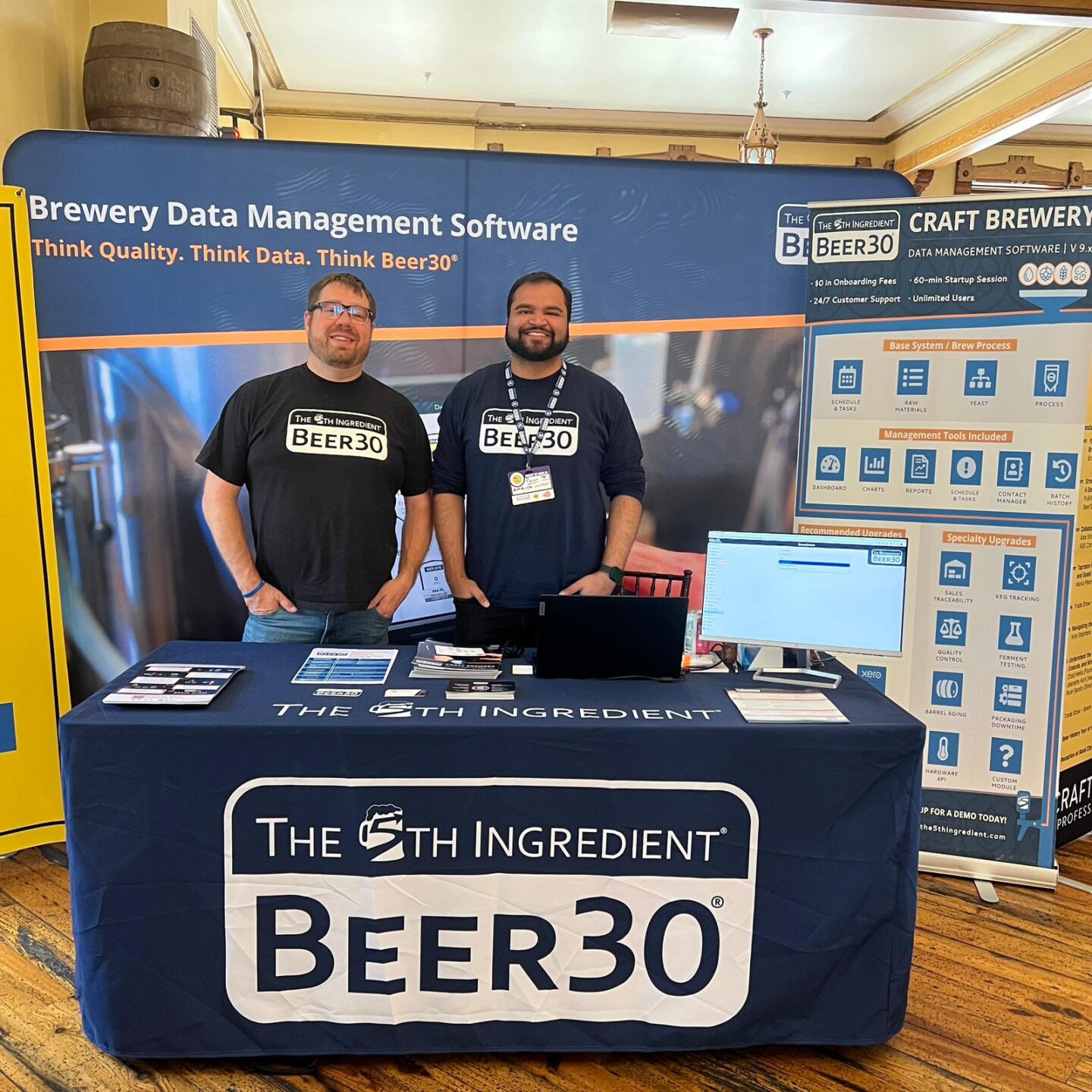Brewing High-Quality Beer: Process Optimization, Quality Control, & Demand Planning
Special guest blogger, Austin Mikula from Beer30, gives the low-down on tech that helps you brew high-quality beer.

For brewers, there is nothing more important than the quality of the beer that’s being brewed. While there are many personal preferences when it comes to things like taste or ABV of the beer, what makes a beer objectively “good” is brewing with consistency, efficiency, and fresh ingredients.
Brewing With Consistency
Brewing a consistent beer is arguably the most important aspect of any brewery. Imagine, you walk into a bar, craving your favorite beer. You want that same great taste and experience every time, right? Consistency delivers just that!
When a brewery nails consistency, it builds a rock-solid reputation. Customers know they can rely on the brewery to deliver the same top-notch quality, flavor, and aroma every single time. It’s like having a trusted friend who never disappoints.
Making sure your product is consistent helps in a number of ways:
- Customer Satisfaction: Consistent brewing ensures that customers get exactly what they’re looking for – the same delicious beer that hits the spot every time. It’s all about keeping the people happy and coming back for more. When customers know they can count on a brewery for their favorite beer, they become loyal fans, spreading the good word and bringing in more business.
- Quality Control: Brewing is an art and consistency is key to mastering that art. It’s about making sure each batch of beer is on point. By keeping things consistent, breweries can maintain the highest standards of quality. From the choice of ingredients to the fermentation process, consistency ensures that every pint meets those high-quality expectations. It’s like maintaining a gold standard that keeps the beer tasting awesome and customers coming back for seconds.
- Brand Differentiation: In a sea of breweries, standing out is key. Consistency sets a brewery apart from the crowd. While being creative is important, customers also crave reliability. When a brewery consistently delivers the goods, it becomes a trusted choice. It’s like having a favorite go-to spot that never lets you down. That consistency becomes part of the brewery’s unique identity, helping it shine in a competitive market.
Overall, consistency builds a killer reputation, satisfies beer enthusiasts, maintains quality control, and sets a brewery apart from the pack.
Brewing Efficiently
For brewers with a passion for brewing, concocting the perfect beer is a lifelong aspiration. Unfortunately, crafting a great pint is only half the battle. As a brewery owner, you also have to worry about the bottom line. It’s hard to brew beer when your utilities are shut off.
That’s where brewing efficiency comes in. Brewing efficiently can not only boost your bottom line but it’s vital for your brewery in a number of ways:
- Cost Savings: Ok, this one is obvious, but that doesn’t make it any less important! Brewing beer involves a lot of moving parts, from raw materials to equipment and energy consumption. Brewing efficiently means optimizing every aspect of the brewing process to minimize waste and reduce costs. By carefully managing ingredient quantities, streamlining production workflows, and maximizing equipment utilization, breweries can save money on materials, labor, and utilities. These cost savings can significantly impact the bottom line and contribute to the overall financial health of the brewery.
- Increased Productivity: Efficiency is all about doing more with less. When a brewery operates efficiently, it can produce more beer in less time without sacrificing quality. By implementing streamlined processes, automating repetitive tasks, and utilizing technology, breweries can improve their production output and meet customer demands effectively. Increased productivity means more beer on the shelves, which can lead to greater sales and market presence.
- Consistency and Quality: Brewing efficiently goes hand in hand with maintaining consistency and quality in every batch of beer. Efficient processes ensure that each step of the brewing process is executed with precision and consistency, leading to a uniform product, and we already went over how important that is for your brewery.
- Resource Conservation: Brewing beer requires significant resources, including water, energy, and raw materials. Brewing efficiently means using these resources wisely and minimizing waste. By implementing sustainable practices such as water recycling, energy-efficient equipment, and waste reduction strategies, breweries can minimize their environmental impact. Not only is this important for the planet, but it also aligns with the values of many consumers who are increasingly seeking eco-friendly products.
- Scalability and Growth: Efficient brewing operations lay a solid foundation for scalability and future growth. By optimizing processes and establishing efficient workflows, breweries can handle increased production volumes without compromising quality or incurring excessive costs. Efficient breweries are better equipped to adapt to market changes, expand their product lines, and enter new markets. This agility and scalability provide a competitive edge and position the brewery for long-term success.
By striving for efficiency in every aspect of the brewing process, breweries can thrive in a competitive industry and meet the demands of beer enthusiasts!
Stay Fresh
Fresh ingredients are the cornerstone of delicious beer. Whether it’s malt, hops, yeast, or adjuncts, using ingredients at their peak freshness ensures that the beer will have vibrant flavors and enticing aromas.
Fresh hops, for example, impart a distinctive aroma and contribute to the beer’s bitterness. Likewise, fresh malt provides the necessary sugars and flavors for a well-rounded beer. By using fresh ingredients, breweries can create brews that truly stand out and leave a lasting impression on beer enthusiasts.
Having fresh ingredients is not only important for a great-tasting beer, there are a number of other reasons to strive for freshness:
- Quality and Shelf Life: Fresh ingredients directly contribute to the overall quality and shelf life of beer. Using stale or expired ingredients can lead to off-flavors, contamination, and even spoilage. Fresh ingredients, on the other hand, have optimal freshness and cleanliness, minimizing the risk of unwanted flavors or microbial issues.
By prioritizing fresh ingredients, breweries can produce beers that have a longer shelf life, reducing the chances of spoilage or quality degradation over time. This not only benefits consumers but also helps breweries maintain their reputation for consistently high-quality products.
- Brewing Efficiency: Fresh ingredients can also enhance brewing efficiency. Fresh hops, for instance, have higher alpha acid levels, which means breweries can extract more bitterness and aroma from a smaller quantity. This efficiency can translate into cost savings and more streamlined brewing processes.
Fresh malt, yeast, and other ingredients also perform optimally, allowing breweries to achieve desired results more efficiently. When ingredients are fresh and in their prime, the brewing process becomes smoother and more predictable.
- Consumer Expectations: In today’s craft beer landscape, consumers have become increasingly discerning and knowledgeable about beer. They appreciate and seek out breweries that prioritize fresh ingredients. By using fresh ingredients, breweries can meet the expectations of beer enthusiasts who value quality, authenticity, and a true craft beer experience.

Brew Consistent, Efficient, & Fresh Beer With Beer30
Luckily there is software to help you brew high-quality beer! Beer30® helps breweries track data from grain to glass. Having the ability to see what’s happening in real-time allows brewers to make better decisions, brew higher quality beer, and brew more efficiently. The software offers a range of features including inventory management, cost of goods sold, task management, lot traceability, sales forecasting, demand planning, and more.
By removing the paper logs that go into daily data tracking, like brew sheets and fermentation profiles, you can enter process data on your mobile device, tablet, or laptop to save time and focus on brewing consistently quality beer.
Improve Quality Control With Beer30
Production mistakes can cause inconsistencies, reduce profits, and overall reduce the quality of your product. It’s crucial to identify and mitigate costly production mistakes and issues before they move further down the process and consume additional resources such as materials, time, and tank space.
Beer30 helps you identify these errors early on by capturing critical quality control data checkpoints, with real-time brewing feedback and sign-offs at every step of the process. The software features real-time proactive notifications for brewing which allows the Head Brewer to be notified if a brew is out of specification. This gives them the ability to intervene immediately and potentially save a batch before it moves too far along in the process.
The software also tracks yeast pitch, harvest, and propagation data and yeast genealogy from batch to batch. Using Beer30, brewers can easily develop a yeast management program to maximize repitching generations and minimize fresh pitch costs. Simultaneously, brewers can identify fermentation issues, such as lagging fermentation or under-attenuation, and proactively phase out a problematic yeast strain to prevent issues in subsequent batches.
Demand Planning Ensures Freshness
By accurately predicting future demand for different beer varieties, breweries can optimize their production schedules, ensuring they have enough supply to meet customer needs without excessive waste or shortages. This proactive approach enables them to adjust ingredient procurement, allocate resources effectively, and streamline their operations.
Beer30’s newest version rollout offers improved planning and coordination between Sales, Purchasing, and Production. The new Demand Planning module helps breweries reduce their cost of goods sold by providing the freshest product possible exactly when the sales team needs it. This powerful tool gives you better visibility into your materials and supplies, production timelines, sales forecasts, and product demand.
The new Demand Report answers the questions:
- What is the brewery’s sales forecast?
- How much beer does the brewery need to produce in BBLs / HL / L?
- What are the packaging formats needed?
- When are finished products needed?
- Does the brewery have the right raw materials and packaging supplies?
The module leverages your brewery’s data to provide accurate and reliable forecasts, empowering breweries to optimize production, reduce waste, and maximize profitability.
The Perfect Pair
Although separate platforms, utilizing both Beer30 and Arryved POS together provides you with a full brewing solution that helps with every step from grain to glass. For more information on how to get started with each of these powerful software, be sure to book a demo!
Book a demo with Beer30 to start tracking your brewery’s data and see everything Arryved has to offer in a free, customized demo!
About The Author
Austin Mikula is the Marketing Specialist at The 5th Ingredient, the company behind Beer30 brewery management software. In his free time, Austin enjoys exploring new breweries and playing volleyball.
